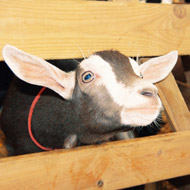
Paper calls for action on peste des petits ruminants
A global eradication strategy for peste des petits ruminants (PPR) has been published by the Food and Agricultural Organisation of the United Nations together with the World Organisation for Animal Health.
The Peste Des Petits Ruminants Global Eradication Programme (PPR) relied on the support of PPR experts and scientists from The Pirbright Institute. The team explored the biology of this disease and identified vital areas that must be better understood if PPR is to be eradicated.
Pirbright’s Dr Dalan Bailey recently collated this information and published a review paper in the Journal of General Virology.
“We hope that this review will highlight the most pressing issues and trigger debate amongst the scientific community, but most importantly encourage researchers to take action,” he said. “With so many factors to consider, it is no surprise that a global effort is required for successful PPR eradication.”
In the paper, the team highlights gaps in three main research areas: fundamental research, vaccines and diagnostics. The researchers also urge their peers to investigate other viruses the might invade a vacated niche, should PPR be eradicated.
PPR is a devastating and neglected livestock disease that is common throughout Africa. Earlier this year, researchers concluded that the lack of a coordinated vaccine, together with porous national borders in North Africa - had enabled the virus to spread to Europe.
Caused by the PPR virus, PPR infects small ruminants such as sheep and goats and can have a mortality rate as high as 90 per cent. Cows and pigs can contract the infection too, however they tend not to develop clinical signs.



 The latest
The latest